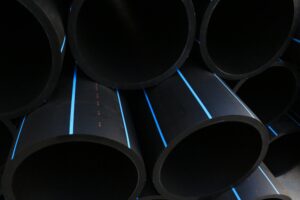Why Are HDPE Pipes Preferred for Industrial Sewerage Applications?
Discover why HDPE pipes are preferred for industrial sewerage applications, highlighting their durability, chemical resistance, and ease of maintenance.

In a big industrial area, there was a big problem with the sewerage system. The pipes were old and blocked, causing a lot of trouble for the factories and workers. It was like having constant traffic jams but with dirty water! Then everything changed. The management decided to use HDPE pipes instead. These pipes are solid and don’t get damaged easily. The sewerage system suddenly worked much better when they started using these new pipes. No more blockages or leaks and everything worked smoothly.
This blog describes how HDPE pipes have fixed a big sewerage problem in industrial areas. We’ll discuss why these pipes are so strong and how they made things a lot easier for everyone.
What Makes HDPE Pipes Ideal for Industrial Sewerage Applications?
HDPE pipes are ideal for industrial sewerage applications because of their high durability, flexibility, and chemical resistance. These pipes are resistant to high pressures and harsh temperatures, which are common in industrial settings. HDPE pipes and fittings also feature a smooth inside surface, which reduces the probability of clogs and promotes efficient flow. They are also lightweight and easy to install, which saves both resources and time. Their resistance to corrosion and abrasion assures a long service life, which makes them an ideal choice for industrial sewerage systems.
What Are the Benefits of Using HDPE Pipes in Industrial Settings?
- Durability: HDPE pipes have a long lifespan, often exceeding 50 years, making them a cost-effective solution for industrial applications.
- Flexibility: They can bend without breaking, which is crucial for installations in areas with ground movement.
- Chemical Resistance: HDPE pipes are resistant to a wide range of chemicals, preventing corrosion and chemical damage.
- Low Maintenance: Their smooth interior surface reduces the risk of clogs and buildup, lowering maintenance requirements.
- Eco-Friendly: HDPE pipes are recyclable, contributing to environmental sustainability.
How HDPE Pipes Are Installed in Industrial Sewerage Systems?
- Site Preparation: Ensure the site is ready by clearing any obstacles and preparing the trench for pipe installation.
- Pipe Joining: Use butt fusion or electrofusion methods to join HDPE pipes, creating a seamless and leak-proof connection.
- Bedding and Backfilling: Place the pipes on suitable bedding material and backfill with appropriate materials to provide support and stability.
- Pressure Testing: Conduct pressure tests to verify the integrity of the installed pipeline before putting it into operation.
- Documentation: Record the installation process, including joint locations and testing results, for future reference and maintenance.
How Do HDPE Pipes Resist Chemical and Corrosion Damage in Sewerage Systems?
HDPE pipes withstand chemical and corrosion damage due to their high-density polyethylene material, which is naturally resistant to many chemicals. This material does not react with most industrial chemicals, therefore the pipes remain intact and work even in harsh environments. Also, HDPE pipes feature a smooth inside surface that blocks the formation of corrosive substances. Due to their resistance to chemical reactions and corrosion, HDPE pipes keep their structural integrity and efficiency for extended periods, reducing the need for frequent repairs or replacements in sewerage systems.
How to Repair Damaged HDPE Pipes in Sewerage Systems?
Repairing damaged HDPE pipes and fittings in sewerage systems involves multiple steps to ensure the integrity of the system. Here are the steps to repair HDPE pipes:
- Identify the Damage: Locate the damaged section of the pipe using visual inspection or advanced diagnostic tools.
- Isolate the Area: Shut off the sewerage flow to the affected area to prevent further damage and contamination.
- Clean the Pipe Surface: Remove any debris, dirt, or chemical residues from the damaged area to ensure a clean repair.
- Apply the Repair Material: Use compatible HDPE welding materials or mechanical couplings to seal the damaged section.
- Test the Repair: Conduct a pressure test to ensure the repair is secure and the pipe is functioning correctly.
How Do HDPE Pipes and Fittings Perform in Harsh Industrial Environments?
HDPE pipes and fittings are perfect for harsh industrial circumstances due to their strong performance and distinct characteristics. They work very well in harsh conditions like chemical exposure, harsh temperatures, and high-pressure scenarios. Their high chemical density and inert nature make them resistant to chemical reactions and corrosion, which leads to long-term durability. Also, HDPE pipes can handle ground movements, vibrations, and external loads without cracking or breaking, which makes them excellent for industrial environments with high demands. Their adaptability, UV resistance, and ease of installation add to their reliability in severe situations.
Can HDPE Pipes and Fittings be used for Residential Sewerage?
HDPE pipes are ideal for residential sewerage systems. They provide multiple advantages that make them ideal for such applications. HDPE pipes are long-lasting, resistant to corrosion and chemicals, and feature a smooth inside surface that minimizes the chance of clogging. They are also lightweight, which makes them simple to install and use. Also, HDPE pipes last a long time and require little maintenance, which makes them the perfect choice for residential sewerage systems. The versatility and reliability of HDPE pipes make them an appropriate choice for residential plumbing needs.
How Do HDPE Pipes and Fittings Compare to Other Materials for Sewerage Systems?
- HDPE pipes are more durable and resistant to corrosion compared to traditional materials like concrete or metal pipes.
- They have a smooth interior surface that reduces friction and the possibility of clogs, improving flow efficiency.
- HDPE pipes are lightweight, which makes them easier and more cost-effective to transport, handle, and install.
- They offer excellent flexibility, which allows them to withstand ground movements and settlement without cracking or breaking.
- HDPE pipes have a longer lifespan and require minimal maintenance compared to other materials, which leads to lower overall costs over time.
What Maintenance Practices Are Recommended for HDPE Pipes in Sewerage Applications?
- Regular inspections to detect any signs of corrosion or damage.
- Keep the pipes clean and free from debris or obstructions.
- Implement preventive measures such as installing filters or screens to prevent clogs.
- Conduct periodic pressure tests to ensure the pipes can withstand the required pressure.
- Apply protective coatings or wraps as needed to enhance durability and resistance to environmental factors.
Quality Pipes for Industrial Sewerage
At Adamjee DuraBuilt, we are well-known for manufacturing high-quality pipes like PVC pipes, UPVC pipes, Schedule 40 pipes, PPRC pipes, HDPE pipes and fittings. Our HDPE pipes are popular choices for industrial sewage applications due to their remarkable durability, resistance to chemicals and corrosion, smooth inside surface, and ease of installation. We ensure that our HDPE pipes fulfil high-quality standards, which makes them ideal for use in the challenging settings of industrial sewerage systems. Adamjee DuraBuilt provides high-quality pipes that excel in industrial applications.
Closing Remarks on HDPE Pipes Ideal for Industrial Sewerage Applications
In short, the choice of HDPE pipes in industrial sewage applications is not without merit. Their exceptional longevity, resistance to chemicals and corrosion, ease of installation, and low maintenance requirements make them the best choice for handling the harsh demands of industrial settings. With HDPE pipes, industries can achieve reliable and long-lasting sewerage systems that contribute to efficient operations and environmental sustainability. Choose HDPE pipes for your industrial sewerage needs and enjoy the outstanding benefits they provide.
Discover more interesting blogs on our site






